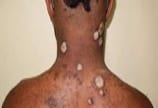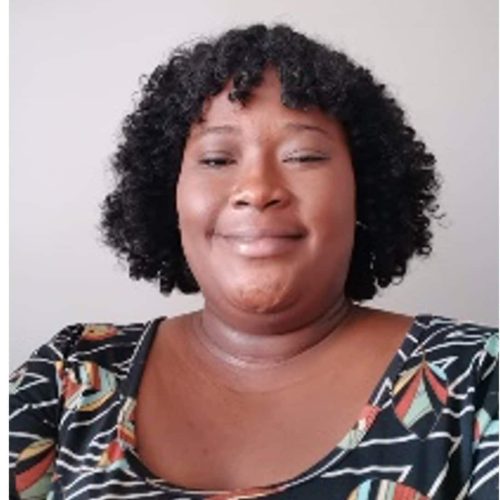Yaws

Project Lead(s)

Professor
Project Background
The Bacteriology Department, NMIMR since the year 2013 has been actively involved in yaws research activities through collaborative research with the Centers for Diseases Control and Prevention (CDC, Atlanta), the World Health Organization (WHO) and the Ghana National Yaws Eradication Program mainly on Yaws PCR diagnosis and PCR assays for the detection of resistance to Azithromycin.
The Department has participated in two WHO Yaws project: 1) a pilot study on community-based mass treatment with azithromycin in Abamkrom sub-district, West Akyem district in the Eastern region and 2), a clinical trial comparing the efficacy of a single dose of treatment of yaws with 20 mg/kg versus 30 mg/kg of azithromycin. During these studies, the Department team successfully isolated Haemophilus ducreyi strains, the causative agent of yaws-like lesions among children in many countries.
The Department has been involved in building capacity of district laboratory teams and health workers in the use of rapid syphilis tests (SD Bioline 3.0 and DPP Chembio) in the diagnosis of yaws, recruitment of participants, sample collection, sample sorting and storage, and transport to NMIMR.
Currently, the yaws team at the Department is providing technical and diagnostic support to 11 districts involved in a Skin-NTDs project with the Ghana Health Service, supported by a Spanish NGO, Anesvad Foundation. The team is also involved in the Clinical evaluation of a Loop-mediated isothermal amplification test for Treponema pallidum pertenue: A Diagnostic tool to support Yaws Eradication (RIA2018D-2495) funded by European & Developing Countries Clinical Trials Partnership. The TPHD-LAMP assay can detect both T. pallidum and H. ducreyi and allows instantaneous differential diagnosis of T. pallidum and H. ducreyi co-infections. The main objective of the research is to assess the accuracy of the TPHD-LAMP for T. pallidum and H. ducreyi diagnosis under programmatic conditions in endemic areas in Ghana, Cote d’Ivoire and Cameroon. The performance of TPHD-LAMP is being assessed by comparison with qPCR results obtained in the national reference laboratory in each country.
Key Publications
- Handley, B. L., Tchatchouang, S., Grout, L., Johnson, R. C., Njih, E., Boua, B., Boock, A. U., Koffi, A. P., Phanzu, D. M., Kotey, N. K., Rogers, E., Dofitas, B., Jung, Y., Maweke, T., Beiras, C. G., Maman, I., Basing, L. A., Ngazoa, S. K., Houezo, J. G., Togbey, K., Telan, E. F., Sarmento, N., Marion, E. Addo, K. K., Mitjà, O., Asideu, K., Harding-Esch, E., Michael Marks, M. (2022): Evaluating the yaws diagnostic gap: a survey to determine the capacity of and barriers to improving diagnostics in all yaws-endemic countries. Frontiers in Tropical Diseases 3:969219 https://doi.org/10.3389/fitd.2022.969219
- Handley, B. L., González-Beiras, C., Tchatchouang, S., Basing, L. A., Hugues, K. A., Bakheit, M., Becherer, L., Ries, C., Tabah, E. N., Crucitti, T., Borst, N., Lüert, S., Frischmann, S., Haerpfer, T., Landmann, E., Amanor, I., Sylla, A., Kouamé-Sina, M. S., Ndzomo-Ngono, J. P., Tano, A., Arhinful, D., Awondo, P., Kakou, S. N., Eyangoh, S., Addo, K. K., Harding-Esch, E. M., Knauf, S., Mitjà, O., Marks, M. (2022): Lamp4yaws: Treponema pallidum, Haemophilus ducreyi loop mediated isothermal amplification − protocol for a cross-sectional, observational, diagnostic accuracy study. BMJ Open 2022;0:e058605. https://doi.org/10.1136/bmjopen-2021-058605
- Frimpong, M., Simpson, S. V., Ahor, H. S., Agbanyo, A., Gyabaah, S., Bernadette Agbavor, B., Amanor, I. B., Addo, K. K., Böhlken-Fascher, S., Jonas Kissenkötter, J., Wahed, A. A. E., Phillips, R. O. (2020): Multiplex Recombinase Polymerase Amplification Assay for Simultaneous Detection of Treponema pallidum and Haemophilus ducreyi in Yaws-Like Lesions. Tropical Medicine and Infectious Disease 5:157 https://doi.org/10.3390/tropicalmed5040157
- Basing, L. A., Simpson, S. V., Adu-Sarkodie, Y., Linnes, J. C. (2020): A Loop-Mediated Isothermal Amplification Assay for the Detection of Treponema pallidum subsp. pertenue. The American Journal of Tropical Medicine and Hygiene103(1):253 259 https://doi.org/10.4269/ajtmh.19-0243
- Munson, M., Cresswell, B., Kondobala, K., Gainwu, B., Lomotey, R. D., Oppong, P., Agyeman, F. O., Kotey, N., Diwura, M., Ako, E. P., Simpson, S. V., Addo, K. K., Pickering, H., Handley, R., Houghton, J., Kwakye, C., Marks, M. (2019): Optimising the use of molecular tools for the diagnosis of yaws. Transactions of the Royal Society of Tropical Medicine and Hygiene 00: 1–5 https://doi.org/10.1093/trstmh/trz083
- Katz, S. S., Chi, K-H., Nachamkin, E., Danavall, D., Taleo, F., Jacob L. Kool, J. L., Addo, K. K., Ampofo, W., Simpson, S. V., Ye, T., Asiedu, K., Ballard, R. C., Chen, C. Y., Pillay, A. (2018): Molecular strain typing of the yaws pathogen, Treponema pallidum subspecies pertenue. PLoS ONE 13(9): e0203632 https://doi.org/10.1371/journal.pone.0203632
- Marks, M., Mitjà, O., Bottomley, C., Kwakye, C., Houinei, W., Bauri, M., Adwere, P., Abdulai, A. A., Dua, F., Boateng, L., Wangi, J., Ohene, S-A., Wangnapi, R., Simpson, S. V., Miag, H., Addo, K. K., Basing, L. A., Danavall, D., Chi, K. H., Pillay, A., Ballard, R., Solomon, A. W., Chen, C. Y., Bieb, S. V., Adu-Sarkodie, Y., Mabey, D. C. W., Kingsley Asiedu, K. (2018): Comparative efficacy of low-dose versus standard-dose azithromycin for patients with yaws: a randomized non-inferiority trial in Ghana and Papua New Guinea. Lancet Global Health: http://dx.doi.org/10.1016/S2214-109X(18)30023-8
- Abdulai, A. A., Nsiire, A., Biney, F., Kwakye, C., Adu-Sarkodie, Y., Ampofo, W. K., Ohene, S-A., Addo, K. K., Simpson, S. V., Tun, Y., Pillay, A., Chen, C. Y., Asiedu, K., Ballard, R. (2018): Community-Based Mass Treatment with Azithromycin for the Elimination of Yaws in Ghana - Results of a Pilot Study. PLoS Negl Trop Dis 12(3): e0006303. https://doi.org/10.1371/journal.pntd.0006303
- Pillay, A., Katz, S.S., Abrams, A.J., Ballard, R.C., Simpson, S.V., Taleo, F., Lahra, M.M., Batra, D., Rowe, L., Trees, D.L., Asiedu, K. & Chen, C-Y. (2016): Complete genome sequences of 11 Haemophilus ducreyi isolates from children with cutaneous lesions in Vanuatu and Ghana. Genome Announcement 4(4):e00459-16.
Team



